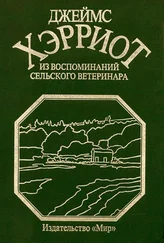Джеймс Хэрриот - All Creatures Great and Small
Здесь есть возможность читать онлайн «Джеймс Хэрриот - All Creatures Great and Small» весь текст электронной книги совершенно бесплатно (целиком полную версию без сокращений). В некоторых случаях можно слушать аудио, скачать через торрент в формате fb2 и присутствует краткое содержание. Год выпуска: 2011, ISBN: 2011, Издательство: Open Road Media, Жанр: Домашние животные, на английском языке. Описание произведения, (предисловие) а так же отзывы посетителей доступны на портале библиотеки ЛибКат.
- Название:All Creatures Great and Small
- Автор:
- Издательство:Open Road Media
- Жанр:
- Год:2011
- ISBN:9781453234488
- Рейтинг книги:4.33 / 5. Голосов: 3
-
Избранное:Добавить в избранное
- Отзывы:
-
Ваша оценка:
- 80
- 1
- 2
- 3
- 4
- 5
All Creatures Great and Small: краткое содержание, описание и аннотация
Предлагаем к чтению аннотацию, описание, краткое содержание или предисловие (зависит от того, что написал сам автор книги «All Creatures Great and Small»). Если вы не нашли необходимую информацию о книге — напишите в комментариях, мы постараемся отыскать её.
All Creatures Great and Small — читать онлайн бесплатно полную книгу (весь текст) целиком
Ниже представлен текст книги, разбитый по страницам. Система сохранения места последней прочитанной страницы, позволяет с удобством читать онлайн бесплатно книгу «All Creatures Great and Small», без необходимости каждый раз заново искать на чём Вы остановились. Поставьте закладку, и сможете в любой момент перейти на страницу, на которой закончили чтение.
Интервал:
Закладка:
“I think I’ve got it, James! You know it’s quite possible it just never occurs to Dennis to pay a bill. So I’m going to pitch him into an environment where it will really be brought home to him. The accounts have just gone out and I’ll arrange to meet him in here at two o’clock next market day. I’ll say I want to discuss his mastitis problem. He’ll be right in the middle of all the other farmers paying their bills and I’ll deliberately leave him with them for half an hour or so. I’m sure it will give him the notion.”
I couldn’t help feeling dubious. I had known Siegfried long enough to realise that some of his ideas were brilliant and others barmy; and he had so many ideas and they came in such a constant torrent that I often had difficulty in deciding which was which. Clearly in this case he was working on the same lines as a doctor who turns on a water tap full force to induce a pent up patient to urinate into a bottle.
The scheme may have merit—it was possible that the flutter of cheque books, the chink of coins, the rustle of notes might tap the long-buried well of debt in Dennis and bring it gushing from him in a mighty flood; but I doubted it.
My doubts must have shown on my face because Siegfried laughed and thumped me on the shoulder. “Don’t look so worried—we can only try. And it’ll work. Just you wait.”
After lunch on market day I was looking out of the window when I saw Dennis heading our way. The street was busy with the market bustle but he was easy to pick out. Chin in air, beaming around him happily, every springing step taking him high on tiptoe he was a distinctive figure. I let him in at the front door and he strutted past me along the passage, the back of his natty sports jacket lying in a neat fold over his protruding buttocks.
Siegfried seated him strategically by Miss Harbottle’s elbow, giving him an unimpeded view of the desk. Then he excused himself, saying he had a dog to attend to in the operating room. I stayed behind to answer the clients’ queries and to watch developments. I hadn’t long to wait; the farmers began to come in, a steady stream of them, clutching their cheque books. Some of them stood patiently by the desk, others sat in the chairs along the walls waiting their turn.
It was a typical bill-paying day with the usual quota of moans. The most common expression was that Mr. Farnon had been “ower heavy wi’ t’pen” and many of them wanted a “bit knockin’ off.” Miss Harbottle used her discretion in these matters and if the animal had died or the bill did seem unduly large she would make some reduction.
There was one man who didn’t get away with it. He had truculently demanded a “bit of luck” on an account and Miss Harbottle fixed him with a cold eye.
“Mr. Brewiss,” she said. “This account has been owing for over a year. You should really be paying us interest. I can only allow discount when a bill is paid promptly. It’s too bad of you to let it run on for this length of time.”
Dennis, sitting bolt upright, his hands resting on his knees, obviously agreed with every word. He pursed his lips in disapproval as he looked at the farmer and turned towards me with a positively scandalised expression.
Among the complaints was an occasional bouquet. A stooping old man who had received one of the polite letters was full of apologies. “I’m sorry I’ve missed paying for a few months. The vets allus come out straight away when I send for them so I reckon it’s not fair for me to keep them waiting for their money.”
I could see that Dennis concurred entirely with this sentiment. He nodded vigorously and smiled benevolently at the old man.
Another farmer, a hard-looking character, was walking out without his receipt when Miss Harbottle called him back. “You’d better take this with you or we might ask you to pay again,” she said with a heavy attempt at roguishness.
The man paused with his hand on the door knob. “I’ll tell you summat, missis, you’re bloody lucky to get it once—you’d never get it twice.”
Dennis was right in the thick of it all. Watching closely as the farmers slapped their cheque books on the desk for Miss Harbottle to write (they never wrote their own cheques) then signed them slowly and painstakingly. He looked with open fascination at the neat bundles of notes being tucked away in the desk drawer and I kept making little provocative remarks like “It’s nice to see the money coming in. We can’t carry on without that, can we?”
The queue began to thin out and sometimes we were left alone in the room. On these occasions we conversed about many things—the weather, Dennis’s stock, the political situation. Finally, Siegfried came in and I left to do a round.
When I got back, Siegfried was at his evening meal. I was eager to hear how his scheme had worked out but he was strangely reticent. At length I could wait no longer.
“Well, how did it go?” I asked.
Siegfried speared a piece of steak with his fork and applied some mustard. “How did what go?”
“Well—Dennis. How did you make out with him?”
“Oh, fine. We went into his mastitis problem very thoroughly. I’m going out there on Tuesday morning to infuse every infected quarter in the herd with acriflavine solution. It’s a new treatment—they say it’s very good.”
“But you know what I mean. Did he show any sign of paying his bill?”
Siegfried chewed impassively for a few moments and swallowed. “No, never a sign.” He put down his knife and fork and a haggard look spread over his face. “It didn’t work, did it?”
“Oh well, never mind. As you said, we could only try.” I hesitated. “There’s something else, Siegfried. I’m afraid you’re going to be annoyed with me. I know you’ve told me never to dish out stuff to people who don’t pay, but he talked me into letting him have a couple of bottles of fever drink. I don’t know what came over me.”
“He did, did he?” Siegfried stared into space for a second then gave a wintry smile. “Well, you can forget about that. He got six tins of stomach powder out of me.”
FIFTY-SIX
THERE WAS ONE CLIENT who would not have been invited to the debtors’ cocktail party. He was Mr. Horace Dumbleby, the butcher of Aldgrove. As an inveterate non-payer he fulfilled the main qualification for the function but he was singularly lacking in charm.
His butcher shop in the main street of picturesque Aldgrove village was busy and prosperous but most of his trade was done in the neighbouring smaller villages and among the scattered farmhouses of the district. Usually the butcher’s wife and married daughter looked after the shop while Mr. Dumbleby himself did the rounds. I often saw his blue van standing with the back doors open and a farmer’s wife waiting while he cut the meat, his big, shapeless body hunched over the slab. Sometimes he would look up and I would catch a momentary glimpse of a huge, bloodhound face and melancholy eyes.
Mr. Dumbleby was a farmer himself in a small way. He sold milk from six cows which he kept in a tidy little byre behind his shop and he fattened a few bullocks and pork pigs which later appeared as sausages, pies, roasting cuts and chops in his front window. In fact Mr. Dumbleby seemed to be very nicely fixed and it was said he owned property all over the place. But Siegfried had only infrequent glimpses of his money.
All the slow payers had one thing in common—they would not tolerate slowness from the vets. When they were in trouble they demanded immediate action. “Will you come at once?,” “How long will you be?,” “You won’t keep me waiting, will you?,” “I want you to come out here straight away.” It used to alarm me to see the veins swelling on Siegfried’s forehead, the knuckles whitening as he gripped the phone.
Читать дальшеИнтервал:
Закладка:
Похожие книги на «All Creatures Great and Small»
Представляем Вашему вниманию похожие книги на «All Creatures Great and Small» списком для выбора. Мы отобрали схожую по названию и смыслу литературу в надежде предоставить читателям больше вариантов отыскать новые, интересные, ещё непрочитанные произведения.
Обсуждение, отзывы о книге «All Creatures Great and Small» и просто собственные мнения читателей. Оставьте ваши комментарии, напишите, что Вы думаете о произведении, его смысле или главных героях. Укажите что конкретно понравилось, а что нет, и почему Вы так считаете.




![Джеймс Хэрриот - О всех созданиях – больших и малых [litres]](/books/391169/dzhejms-herriot-o-vseh-sozdaniyah-bolshih-i-malyh-thumb.webp)







